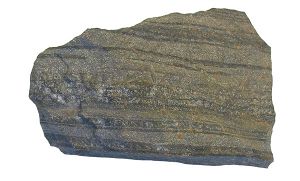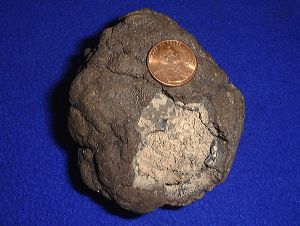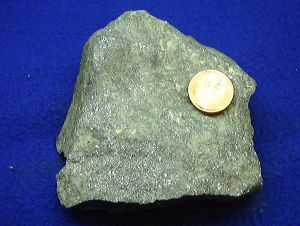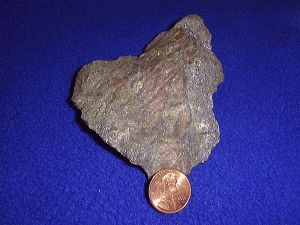Ore
- For other uses, see Ore (disambiguation).




An ore is a volume of rock containing components or minerals in a mode of occurrence which renders it valuable for mining. An ore must contain materials which are:
- valuable
- in concentrations which can be profitably mined, transported, milled, and processed.
- able to be extracted from waste rock by mineral processing techniques.
Ore deposits are mineral deposits defined as being economically recoverable. Mineral deposits may include those bodies of mineralisation which are uneconomic resources, of too low a grade or tonnage or technically impossible for extraction of the contained metal.
What is valuable to mine is generally considered in terms of purely economic considerations. However, cultural, strategic or social goals of nations, tribes and individuals may render economically unfeasible bodies of rock valuable for extraction, for instance ochre, some clays and ornamental stones which are of religious, cultural or sentimental value to a population. Here, value is placed on the rock in non-economic terms
Rare samples of ore in the form of exceptionally beautiful crystals, exotic layering (when sectioned or polished) or metalic presentations such as large nuggets or chrystaline formations of metals such as gold or copper may command a value far beyond their value as mere ore or raw metal for subsequent reduction to utilitarian purposes.
Ore is thus an economic entity, not a physical entity. Fluctuations in commodity prices will determine what rock is considered valuable and hence ore, and what rock is not valuable and is considered waste. Similarly, the costs of extraction may fluctuate, for example with fuel costs, rendering mining unprofitable and turning ore into waste.
The grade or contained concentration of an ore mineral, or metal, as well as its form of occurrence, will directly affect the costs associated with mining the ore. The cost of extraction must thus be weighted against the contained metal value of the rock and a 'cut-off grade' used to define what is ore and what is waste.
Ore minerals are generally oxides, sulfides, silicates, or "native" metals (such as copper) that are not commonly concentrated in the Earth's crust or "noble" metals (not usually formng compounds) such as gold. The ores must be processed to extract the metals of interest from the waste rock and from the ore minerals.
Ore bodies are formed by a variety of geological processes. The process of ore formation is called ore genesis.
Important ore minerals
- Argentite: Ag2S
- Barite: BaSO4
- Bauxite Al2O3 for production of aluminum
- Beryl: Be3Al2(SiO3)6
- Bornite: Cu5FeS4
- Cassiterite: SnO2
- Chalcocite: Cu2S for production of copper
- Chalcopyrite: CuFeS2
- Chromite: (Fe,Mg)Cr2O4 for production of chromium
- Cinnabar: HgS for production of mercury
- Cobaltite: (Co,Fe)AsS
- Columbite-Tantalite or Coltan: (Fe,Mn)(Nb,Ta)2O6
- Galena: PbS
- Gold: Au, typically associated with quartz or as placer deposits
- Hematite: Fe2O3
- Ilmenite: FeTiO3
- Magnetite: Fe3O4
- Molybdenite: MoS2
- Pentlandite:(Fe,Ni)9S8
- Scheelite: CaWO4
- Sphalerite: ZnS
- Uraninite (pitchblende): UO2 for production of metalic uranium
- Wolframite: (Fe,Mn)WO4
See also
- Mineral resource classification
- Economic geology
- Ore genesis
bg:Руда da:Malm de:Erze et:Maak eo:Erco fr:Minerai it:Minerale lt:Rūda nl:Erts no:Malm (geologi) nn:Malm ug:رۇدا pl:Ruda pt:Minério ru:Руда simple:Ore sl:Ruda fi:Malmi sv:Malm
